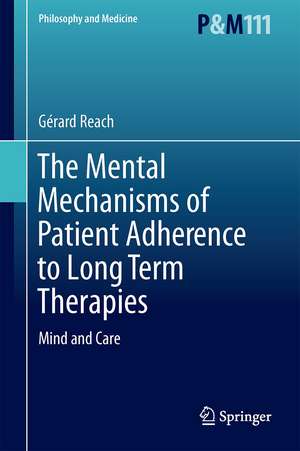The Mental Mechanisms of Patient Adherence to Long-Term Therapies: Mind and Care: Philosophy and Medicine, cartea 118
Autor Gérard Reachen Limba Engleză Hardback – 20 ian 2015
| Toate formatele și edițiile | Preț | Express |
|---|---|---|
| Paperback (1) | 384.48 lei 6-8 săpt. | |
| Springer International Publishing – 6 oct 2016 | 384.48 lei 6-8 săpt. | |
| Hardback (1) | 391.79 lei 6-8 săpt. | |
| Springer International Publishing – 20 ian 2015 | 391.79 lei 6-8 săpt. |
Din seria Philosophy and Medicine
- 18%
 Preț: 3071.11 lei
Preț: 3071.11 lei - 18%
 Preț: 789.52 lei
Preț: 789.52 lei - 15%
 Preț: 636.80 lei
Preț: 636.80 lei - 15%
 Preț: 643.16 lei
Preț: 643.16 lei - 15%
 Preț: 644.95 lei
Preț: 644.95 lei - 18%
 Preț: 949.23 lei
Preț: 949.23 lei - 5%
 Preț: 1154.22 lei
Preț: 1154.22 lei - 18%
 Preț: 1223.74 lei
Preț: 1223.74 lei - 15%
 Preț: 645.60 lei
Preț: 645.60 lei - 18%
 Preț: 949.23 lei
Preț: 949.23 lei - 15%
 Preț: 644.49 lei
Preț: 644.49 lei - 18%
 Preț: 948.79 lei
Preț: 948.79 lei - 24%
 Preț: 780.13 lei
Preț: 780.13 lei - 18%
 Preț: 1227.04 lei
Preț: 1227.04 lei -
 Preț: 395.85 lei
Preț: 395.85 lei - 5%
 Preț: 1103.95 lei
Preț: 1103.95 lei - 18%
 Preț: 945.30 lei
Preț: 945.30 lei - 18%
 Preț: 1383.94 lei
Preț: 1383.94 lei - 15%
 Preț: 643.34 lei
Preț: 643.34 lei - 18%
 Preț: 1130.45 lei
Preț: 1130.45 lei - 15%
 Preț: 640.55 lei
Preț: 640.55 lei - 15%
 Preț: 639.59 lei
Preț: 639.59 lei -
 Preț: 389.70 lei
Preț: 389.70 lei - 18%
 Preț: 948.61 lei
Preț: 948.61 lei - 5%
 Preț: 1092.79 lei
Preț: 1092.79 lei - 20%
 Preț: 557.46 lei
Preț: 557.46 lei - 15%
 Preț: 642.36 lei
Preț: 642.36 lei -
 Preț: 385.08 lei
Preț: 385.08 lei - 15%
 Preț: 644.95 lei
Preț: 644.95 lei
Preț: 391.79 lei
Nou
Puncte Express: 588
Preț estimativ în valută:
74.98€ • 81.42$ • 62.98£
74.98€ • 81.42$ • 62.98£
Carte tipărită la comandă
Livrare economică 22 aprilie-06 mai
Preluare comenzi: 021 569.72.76
Specificații
ISBN-13: 9783319122649
ISBN-10: 3319122649
Pagini: 275
Ilustrații: XXI, 207 p. 23 illus.
Dimensiuni: 155 x 235 x 20 mm
Greutate: 0.5 kg
Ediția:2015
Editura: Springer International Publishing
Colecția Springer
Seria Philosophy and Medicine
Locul publicării:Cham, Switzerland
ISBN-10: 3319122649
Pagini: 275
Ilustrații: XXI, 207 p. 23 illus.
Dimensiuni: 155 x 235 x 20 mm
Greutate: 0.5 kg
Ediția:2015
Editura: Springer International Publishing
Colecția Springer
Seria Philosophy and Medicine
Locul publicării:Cham, Switzerland
Public țintă
ResearchCuprins
1 Introduction: The doctor, her patient, and their reasons.- 1. Adherence and nonadherence to therapies: A definition.- 2. Nonadherence: How frequent is it?.- 3. The consequences of nonadherence.- 4. Scope of the book.- 5. Some simple explanations for nonadherence.- 6. A typology of adherence? Analogous or homologous phenomena.- 7. The real question.- 8. From behavior to action.- 9. A philosophical interpretation of adherence to long-term therapies.- 2 The classic view: .- 1. Determinants of nonadherence to long-term therapies 2.- Behavioral models of patient adherence.- 3. Limitations of psychological models.- 4. A new perspective.- 5.Psychology and philosophy, in search of mental mechanisms.- 6. Observation and explanation.- 7. Patient and agent.- 3 Intentionality.- 1. What is ‘in your head’.- 2. A mental puzzle and its formation.- 3. Actions: A causal theory.- 4 An intentionalist model of adherence.- 1. Therapeutic agency.- 2. Anintentionalist model of adherence.- 3. The pivotal role of emotions in patient adherence.- 4. Bringing action into play: Volition.- 5 The dynamics of intentionality.- 1. Motivational force.- 2. Self-control.- 3. The force of habit.- 4. Intention, decision, and willpower.- 5. The dynamics of intentionality.- 6 Medical irrationality.- 1. Akrasia.- 2. Patient nonadherence as a case of akrasia.- 3. Another example of irrationality: The denial of illness.- 4. Logical mechanisms of irrationality.- 7 Time and adherence: A principle of foresight.- 1. The effect of time.- 2. The principle of foresight.- 3. The appearance of adherence.- 4. A physiopathological point of view.- 5. A top-down model of adherence.- 8 An intentionalist account of doctor-patient relationship and biomedical ethics.- 1. Philosophical analysis of doctor-patient relationship.- 2. The principle of charity.- 3. Adherence and autonomy.- 9 Doctors’ clinical inertia as myopia.- 1. Clinical inertia: Definition and logical description.- 2. Empirical evidence: The paradigm case of psychological insulin resistance.- 3. Empathy and sympathy.- 4. The paradox of empathy in medical care.- 5. Another conception of sympathy.- 6. Care, sympathy, beneficence, and love.- 7. Care as a special form of sympathy.- 8. The respective values of immediacy and future.- 9. Empathy, sympathy, and the ethical dynamics of the pa-tient-doctor relationship.- 10. A model of chronic care involving patient education and trust.- 11. Conclusion: Mind and Care.- 10 Conclusion: Adherence Generalized.- 1. A choice between two actions.- 2. Generalization of the problem.- 3. Defining adherence by its explanation.- 4. Eros and Thanatos.
Notă biografică
The author is a diabetologist and Professor of Endocrinology, Diabetology and Metabolic Diseases at Paris 13 University. He has authored several books, including one published by Springer under the title: Clinical Inertia, A Critique of Medical Reason.
Textul de pe ultima copertă
The goal of this book is to describe the mechanisms of patients’ adherence to long-term therapies, whose improvement, according to the World Health Organization (WHO), would be more beneficial than any biomedical progress. For example, approximately half of the patients do not regularly follow medical prescriptions, resulting in deleterious effects on people’s health and a strong impact on health expenditure.
This book describes how our beliefs, desires, and emotions intervene in our choices concerning our health, by referring to concepts developed within the framework of the philosophy of mind. In particular, it tries to explain how we can choose between an immediate pleasure and a remote reward—preserving our health and our life. We postulate that such an “intertemporal” choice can be directed by a “principle of foresight” which leads us to give priority to the future.
Just like patients’ non-adherence to prescribed medications, doctors often don’t always do what theyshould: They are non-adherent to good practice guidelines. We propose that what was recently described as “clinical inertia” could also represent a case of myopia: From time to time doctors fail to consider the long-term interests of their patient.
Both patients’ non-adherence and doctors’ clinical inertia represent major barriers to the efficiency of care. However, it is also necessary to respect patients’ autonomy. The analysis of relationship between mind and care which is provided in this book sheds new light on the nature of the therapeutic alliance between doctor and patient, solving the dilemma between the ethical principles of beneficence and autonomy.
This book describes how our beliefs, desires, and emotions intervene in our choices concerning our health, by referring to concepts developed within the framework of the philosophy of mind. In particular, it tries to explain how we can choose between an immediate pleasure and a remote reward—preserving our health and our life. We postulate that such an “intertemporal” choice can be directed by a “principle of foresight” which leads us to give priority to the future.
Just like patients’ non-adherence to prescribed medications, doctors often don’t always do what theyshould: They are non-adherent to good practice guidelines. We propose that what was recently described as “clinical inertia” could also represent a case of myopia: From time to time doctors fail to consider the long-term interests of their patient.
Both patients’ non-adherence and doctors’ clinical inertia represent major barriers to the efficiency of care. However, it is also necessary to respect patients’ autonomy. The analysis of relationship between mind and care which is provided in this book sheds new light on the nature of the therapeutic alliance between doctor and patient, solving the dilemma between the ethical principles of beneficence and autonomy.
Caracteristici
Discusses the philosophical issues surrounding the notion of adherence to medical prescriptions and to healthy life, asking the question: why does one take care of one-self? Addresses the role of cognition, emotions and self-love in self-care Explores the relationship between adherence and willpower and between nonadherence and weakness of will Proposes the existence of a principle of foresight to explain how adherence is possible Provides a new insight on the patient-physician relationship, on the dilemma between the ethical principles of beneficence and autonomy, and on the meaning of patient education Includes supplementary material: sn.pub/extras













